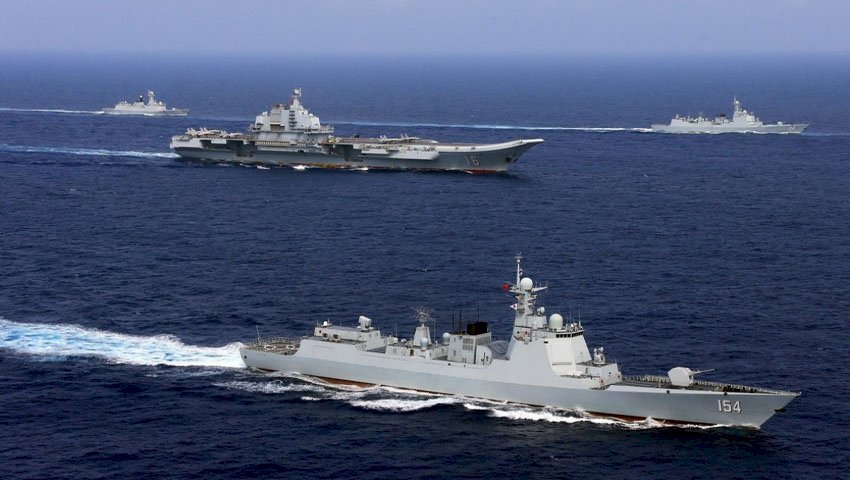|
Listen to article
Getting your Trinity Audio player ready...
|

The global maritime space, comprising the world’s seas and oceans, has historically been very important to all of the world’s nations. Traditionally, while the coastal states have heavily depended on the waters abutting their land territories for their economic growth, development & livelihood; the free flow of international trade and commerce through the sea lanes is critical for all trading nations alike. In the 21st century, the importance of the global maritime space has multiplied multi-fold, more so, as the waters are increasingly becoming a political medium for show of strength often leading to military confrontations between nations. Two centuries ago, a revered American Naval strategist, Sir Alfred Thayer Mahan had stated, ‘whoever rules the waves, will rule the world”. This appears to be the strategic mantra guiding the maritime foreign policy of the powerful & to-be powerful nations today.
Today, the waters encompassed within the Indo-Pacific region, the world’s most strategically significant area, are grounds for a range of new and aggravated maritime conflicts between nations. The new seriousness in the conflicts, for the most part, is attributable to China and its actions in the region. Driven by an expansionist vision coupled with its ‘might makes right’ ideology and its predatory worldview, China’s actions in the Indo-Pacific today present a formidable threat to peace and security of the region. China with a coastline that extends over three seas, the yellow sea, the South China Sea and the East China Sea, all of which lie within the Indo-Pacific, poses a challenge not just to its littoral neighbors, but to many of the world’s nations.
In the yellow sea, China & South Korea have a maritime boundary dispute with respect to their exclusive economic zones (EEZ). While international law provides a state with exclusive fishing rights upto 200 nm from its coastline, Chinese fishermen are often found illegally fishing close to South Korea’s coastline, including in its territorial waters, with frequent scuffles reported between South Korean coast guard officers and Chinese fishermen.
In recent times, the Chinese fishing fleets are often found escorted and guarded by Chinese Navy and coast guard vessels to protect their illegal fishing in South Korean waters. Multiple rounds of negotiations to demarcate a mutually agreeable boundary line with respect to their overlapping EEZs have so far failed. While South Korea maintains that the boundary should be determined by the median line principle as provided under international law (UNCLOS), China argues that the line should be proportional to China’s larger population and longer coastline, against established international law and custom. Tensions between China and Japan over the ownership of the contested Senkaku/Diaoyu islands in the East China Sea are on the rise as both countries aggressively improve their military capabilities in the region.
While Japan claims historic ownership of the islands since 1895, China’s claim to ownership allegedly began around the 1970’s, only after reports of lucrative oil & gas and fish reserves were found in surrounding waters. A few months ago, Japan through its defense white paper submitted that China has been relentlessly and unilaterally attempting to change the status quo around the Senkaku islands by coercion.
In the South China Sea, China has a maritime boundary dispute with Vietnam concerning their EEZs. While formerly both countries had restrained from conducting oil exploration activities in the contested waters, in 2014, China moved a Chinese mobile oil rig into disputed territory. This led to massive anti-Chinese riots in Vietnam resulting in evacuation of many Chinese nationals and destruction of hundreds of Chinese owned businesses in Vietnam.
Similarly, China has a maritime boundary dispute with Indonesia with respect to the demarcation of their EEZs and the two have historically clashed over their respective exclusive fishing rights in the disputed maritime area.
Recently, the support and assistance of the Chinese government to illegal fishing incursions in disputed waters has been exposed with frequent incidents of Chinese coast guard vessels found escorting Chinese fishermen in Indonesian waters. Indonesia has raised several diplomatic protests against the Chinese Coast Guard’s high-handed behavior in the disputed waters but to no avail.
Ironically, China claims ownership of over 90% of the South China Sea, the most contested maritime space in the world today, through a self-styled nine-dash line. Though China has not yet used the nine-dash-line as an inviolable border, it has also not officially explained the meaning of the line, raising suspicion internationally over its intentions in the South China Sea.
Along with its littorals, the South China Sea is equally critical for all the world’s trading nations as more than 40% of the world’s shipping passes through it, carrying more than $ 3 trillion of trade each year. Concerned by China’s aggressive actions in the South China Sea threatening free flow of international trade and commerce, a few countries including USA, Japan and Australia have increased their naval activities and are conducting freedom of navigation exercises (FONOP’s) in order to ensure that commercial ships can sail without restraints through all areas of the sea permitted by international law. China has declared these freedom of navigation exercises, legally permitted customary international practices as ‘provocative’. As a consequence, naval vessels of many nations operate in close range in narrow spaces in the South China Sea today, escalating the threat of an armed conflict, even if caused accidentally.
Further, the South China Sea also comprises critical and narrow straits that are used for international trade and navigation. The Strait of Malacca for example, offers the shortest navigational route between Europe and the Asia Pacific and is the transit passage for supertankers transporting oil from Africa and the Middle East to resource-dependent East Asian nations. Any interference, disruption or delay in the free flow of trade through these narrow straits would threaten peace, security and freedom of navigation in the region along with creating serious domestic turmoil in oil and trade dependent nations.
China also claims ownership of a few major archipelagic groups situated in the South China Sea, comprising groups of islands/islets, rocks & reefs. As a consequence, China lays claim to both the land territory along with all the maritime zones applicable to the island/rock under law. Under international law, an ‘island’ is entitled to all maritime zones, namely a territorial sea, contiguous zone, exclusive economic zone and continental shelf; whereas, rocks which cannot sustain human habitation are only entitled to a territorial sea and contiguous zone.
Furthermore, China is carrying out rampant land reclamations, large scale industrial constructions and also building military installations on submerged islands and reefs, fundamentally changing the political and ecological status quo of the region. While China is not the only nation conducting land reclamation activities and constructing military installations on tiny islands and reefs, the scale and speed of China’s build-up of recently occupied maritime islands and reefs is of serious concern.
In 2016, on a request of the Philippines, an aggrieved littoral state of the South China Sea, an international arbitral tribunal established under the international law ruled that China’s claim to the nine-dash-line in the South China Sea is illegal. Yet, China, nonchalantly, continues to exercise its illegal claims and has publicly rejected the order of the international tribunal, which it ought to follow as per international law.
China has replaced international law with its ‘might makes right’ philosophy and established international institutions like the UN have failed to make any impact. China being a veto-wielding permanent member, it has the right to veto any decision of the UN Security Council, the highest enforcement authority of the UN. Therefore, as China’s maritime expansionism displays increased aggressivenes and in view of the changed geo-political circumstances, the primary agenda for all trading and maritime nations should be to collectively develop an efficient international legal framework to restore the rule of law in the maritime domain.






Excellent Hamsa
Good job 👍
Well done👍